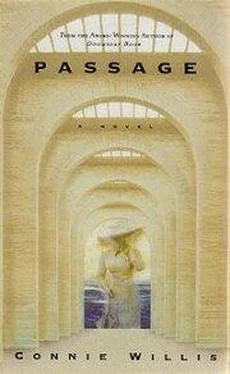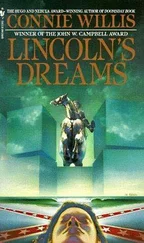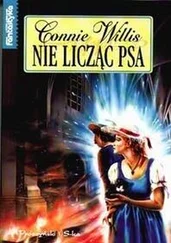She nodded reluctantly. “Just stop that thing!” she yelled, her hands over her ears.
He nodded and pushed the emergency button. It kept ringing. He pushed “door open.” Nothing. He twisted the emergency button again, and then the floor buttons, one after the other. Nothing. He tried turning the emergency button the other way, but that only seemed to make the alarm louder. If that were possible.
Joanna reached past him to press the “door open” button again, and the elevator moved upward, though the ringing still didn’t stop. Richard yanked at the emergency button again, and the noise abruptly shut off, leaving an echoing ringing in his ears.
“Whoa, was it a ringing or a buzzing?” he said, hoping she’d smile.
She didn’t. She pressed “six,” and the doors slid open. Richard had half-expected a crowd of anxious rescuers, or at least someone who’d come out to see what all the noise was, but the hall was empty. Joanna stalked off the elevator and down to the lab ahead of him, her chin in the air. Inside, she turned to face him, her arms folded across her chest.
“Do you realize we could have been trapped in there forever,” Richard said, trying to break the ice, “and nobody would ever have come to rescue us?”
Nothing.
“Look,” he said. “I’m sorry I flew off the handle like that. It’s just that—”
“—you thought I’d turned into one of Mr. Mandrake’s nutcases,” she said. “How could you think that?”
“Because people do it all the time. Perfectly rational people who suddenly announce they’ve seen the light and start spouting nonsense. Look at Seagal. Look at Foxx.”
“But you knew me,” she said.
“Like you knew Mr. Wojakowski?”
“Touché,” she said quietly. “But when he told me about being on the Yorktown during Pearl Harbor, I didn’t just accuse him. I checked my facts first. I got outside confirmation. You didn’t even listen to what I was trying to tell you.”
“I’m listening now,” he said.
Her chin shot up again. “Are you?”
“Yes,” he said seriously. He indicated a chair, and she sat down, looking wary. He sat down, too, and bent forward, his hands between his knees. “Shoot.”
“All right.” She pushed her glasses up on her nose. “It was the Titanic…” He must have tensed involuntarily, because she said, “I thought you said you were going to listen.”
“I am. It was the Titanic.”
“But it didn’t feel like I was in 1912, or like I was seeing the ship that night. It wasn’t like that.”
“What was it like?”
She got the thoughtful, inward look she had had when she was trying to identify the noise. “It was the Titanic, but not the Titanic. I knew I wasn’t on board the actual ship, that what I was seeing wasn’t an event from that night. But, at the same time, it was the Titanic.”
“It didn’t feel real?” Richard asked. “Was it a superimposed vision?”
“No,” she said. “The vision was substantial and three-dimensional, just like the other times. The illusion that you’re really in that place is complete. I was really there in the passage and standing on the deck, only…” She seemed to draw into herself. “It was as if there was something else behind it, some deeper reality…” She looked curiously at him. “But why would I see the Titanic?”
“I don’t think you did,” he said. “I think you confabulated it. You didn’t recognize it as the Titanic during the NDE. You concluded that afterward while you were giving your account. You’re familiar with the process. Your conscious mind…”
“No,” Joanna said. “I recognized it in the passage that very first time. I told you. I knew I recognized it but that I’d never been there. And if it was a confabulation, why would I confabulate the Titanic, of all things? Confabulations are the result of expectations and influences. I’ve never heard of anyone seeing the Titanic in his or her NDE. If I confabulated it, why didn’t I see an Angel of Light or a golden stairway?”
“There are a couple of possibilities. Come over here a minute,” he said, standing up and going over to the console. He called up four images from her NDE. “Look at this,” he said, pointing to a scattering of orange, red, and yellow points in the frontal cortex of each scan. “Those are random neural firings in the area of the frontal cortex devoted to long-term memory. One of those firings may have been a memory of the Titanic.”
“But it wasn’t just one memory, it was dozens of memories. The engines stopping and the passage and the passengers standing outside on the deck—”
“Which may all be confabulations growing out of that memory, the sensations of sound, light, and figures in white you were experiencing, and the same sort of persistence of meaning that causes dreams to be a coherent story rather than a series of separate images.”
She didn’t look convinced. “But why would a Titanic neuron fire, out of all the—how many are there? Millions, billions of memories?”
“That’s what random means,” Richard said, “and your remembering something about the Titanic wouldn’t be that statistically unlikely.”
Now Joanna was looking at him like he was crazy. “It wouldn’t?”
“No. After all, it’s a disaster, and you spend a lot of time talking to Maisie about disasters.”
Joanna shook her head. “But not the Titanic. I don’t think I’ve ever heard Maisie mention the Titanic.”
“She talked about the Lusitania, and I’ll bet you anything there are pictures of the Titanic in those books of hers,” Richard said. “The day I met her she turned every single page, looking for some photo. You could have seen that picture of the Titanic half out of the water,” but Joanna was shaking her head.
“If it was Maisie, I’d have been more likely to have seen Pompeii, and that isn’t where the memory’s from.”
That’s interesting, Richard thought. “You know the source of the memory?”
She got that odd, inward look again. “No. But I know it wasn’t Mr. Wojakowski or Maisie. And it wasn’t random.”
“How do you know?”
“Because… I don’t know,” she said, defeated. “It doesn’t feel random. It feels like it came from something.”
“It might have,” Richard said. “Frequently accessed long-term memories have stronger neuronal pathways than the average memory, which makes them easier to retrieve.”
“But the Titanic’s not a frequently accessed memory. I haven’t thought of it since—”
“The movie came out?” Richard said. “That’s the most obvious source. It even has a scene at the end where the old woman sees herself on the Titanic in a white dress surrounded by a halo of light. You saw the movie—”
“Five years ago,” Joanna said, “and I didn’t even like it.”
“Liking wouldn’t have anything to do with it,” Richard said, “and there are references to the Titanic everywhere—TV specials, books. I heard that godawful song of Celine Dion’s on my way to the hospital this morning, and I know for a fact you’ve accessed Titanic -related memories twice recently.”
“When?” she demanded.
“The day I met you, you told me about the spiritualist—what was his name? Stead?—going down on the Titanic, and that night at Vielle’s, you said Dish Night was a Titanic -free zone, so the neural pathway would have been not only recent, but reinforced. Your memory of the scene in the movie where the engines stopped and the passengers went out on deck to see what had happened—”
Читать дальше












